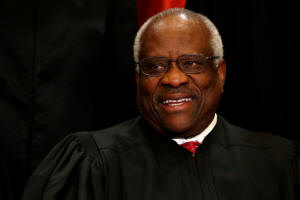U.S. Supreme Court Justice Thomas in hospital for infection
 Send a link to a friend
Send a link to a friend
 [March 21, 2022]
WASHINGTON (Reuters) - U.S. Supreme
Court Justice Clarence Thomas was admitted to a hospital in Washington
on Friday after experiencing flu-like symptoms and was diagnosed with an
infection, the high court said on Sunday. [March 21, 2022]
WASHINGTON (Reuters) - U.S. Supreme
Court Justice Clarence Thomas was admitted to a hospital in Washington
on Friday after experiencing flu-like symptoms and was diagnosed with an
infection, the high court said on Sunday.
Thomas, 73, was being treated with intravenous antibiotics, his symptoms
were abating, and he expected to be released from the Sibley Memorial
Hospital in a day or two, the court said in a statement.
The Supreme Court, which is set to be in session on Monday, said that
Thomas will participate in the consideration of cases through briefs,
transcripts, and audio of the oral arguments.
The court is set to hear four cases this week.
A court representative said earlier that all nine justices were fully
vaccinated against COVID-19 and had received booster doses.

A conservative and one of two Black men to have served on the Supreme
Court, Thomas is the longest-serving of the current justices. The
Supreme Court has a 6-3 conservative majority, including three justices
appointed by President Joe Biden's Republican predecessor Donald Trump.
Thomas was nominated by President George H.W. Bush in 1991 to fill the
Supreme Court vacancy created by the retirement of liberal justice
Thurgood Marshall, the first Black justice on the court.
[to top of second column]
|

U.S. Supreme Court Justice Clarence Thomas participates in taking a
new "family photo" with his fellow justices at the Supreme Court
building in Washington, D.C., U.S., June 1, 2017. REUTERS/Jonathan
Ernst
 Separately on Monday, hearings will
begin for federal appellate judge Ketanji Brown Jackson, Biden's
nominee, to become the first Black woman to serve on the Supreme
Court. Biden has tapped her to replace Stephen Breyer, 83, who is
retiring and is the oldest justice on the current court.
Thomas spoke on March 11 in Utah and raised concerns about calls to
add additional members to the court, and discussed how the COVID-19
pandemic prompted the court to conduct arguments remotely.
"I didnít like the free-for-all in oral arguments where we
interacted and interrupted each other. Itís more productive now. The
arguments are contributing to the process of deciding the case as
opposed to what was happening, which was almost like a catfight,"
Thomas said, according to the Salt Lake Tribune.
(Reporting by Ismail Shakil in Bengaluru and David Shepardson in
Washington; Editing by Rosalba O'Brien and Stephen Coates)
[© 2022 Thomson Reuters. All rights
reserved.] This material may not be published,
broadcast, rewritten or redistributed.
Thompson Reuters is solely responsible for this content.
 |